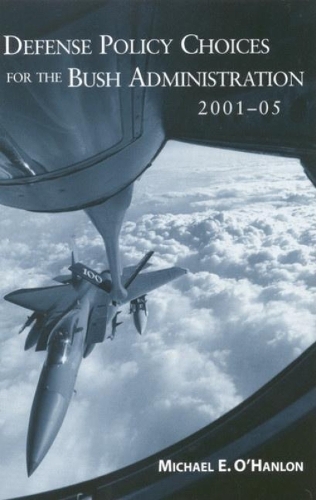
Defense Policy Choices for the Bush Administration, 2001-2005
(Paperback)
Publishing Details
Defense Policy Choices for the Bush Administration, 2001-2005
By (Author) Michael E. O'Hanlon
Bloomsbury Publishing PLC
Brookings Institution
1st March 2001
United States
Classifications
Tertiary Education
Non Fiction
Central / national / federal government policies
355.033573090511
Physical Properties
Paperback
258
Width 152mm, Height 229mm
454g
Description
"
This latest study in the Brookings series on U.S. defense strategy and the defense budget reviews current American military capabilities and offers suggestions for the new administration and Congress. Michael O'Hanlon makes sense of the hot political topic of military readiness, questions the continued relevance of the current two-war framework for structuring most conventional combat forces, and challenges the wisdom of current plans for the procurement of advanced jet fighters, helicopters, and submarines. The book also focuses on missile defense, other means of homeland defense, the so-called revolution in military affairs, and possible conflicts between Taiwan and China that could involve U.S. forces. Throughout, the author looks for ways to close the gap between the cost of projected U.S. defense forces and the budget actually available to the Pentagon.
"Reviews
"The Brookings Institution Press continues its reputation for excellence with the publication of a number of recent works examining US defense strategy and the American security agenda.... (discusses 'Defense Policy' and 'Defending America')." Robert H. Taylor, Parameters, U.S. Army War College Quarterly, 7/1/2001
|"... the author was prescient enough to include a chapter on home defense, with mentions of Al-Qa'ida and bin Laden." William Hopkinson, International Affairs, 4/1/2002
|"The book offers excellent 'Military 101' overviews of a potential China-Taiwan conflict.... This book provides a solid grounding for both the budgetary battles that lie ahead and the most likely military engagements of the near future." Troy K. Schneider, NationalJournal.com, 1/24/2002
Author Bio
Michael E. O'Hanlon is a senior fellow in Foreign Policy Studies at the Brookings Institution, where he holds the Sydney Stein Jr. Chair. His recent books include The Future of Arms Control (Brookings, 2005; with Michael A. Levi), Neither Star Wars nor Sanctuary (Brookings, 2004), and Crisis on the Korean Peninsula (McGraw Hill, 2003; with Mike Mochizuki).
